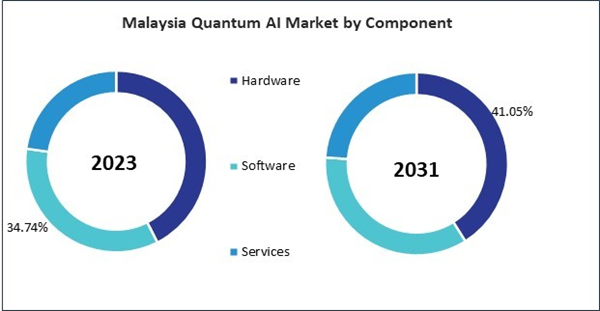The China market dominated the Asia Pacific Quantum AI Market by Country in 2023, and would continue to be a dominant market till 2031; thereby, achieving a market value of $139.8 million by 2031. The Japan market is registering a CAGR of 35.2% during (2024 - 2031). Additionally, the India market would showcase a CAGR of 37% during (2024 - 2031).
In the financial sector, the need for enhanced computational power in AI is also becoming increasingly critical. Financial institutions rely on AI for risk assessment, fraud detection, and algorithmic trading. These applications require the analysis of massive datasets and the execution of complex algorithms to make accurate predictions and decisions. For example, algorithmic trading involves rapidly processing market data to identify profitable trading opportunities within milliseconds. Classical computing systems often struggle to keep up with the speed and complexity required for such tasks.
Moreover, the healthcare industry is also experiencing a growing need for enhanced computational power in AI, particularly in genomics and precision medicine. The analysis of genetic data to develop personalized treatment plans entails the processing of extensive quantities of information in order to identify patterns and correlations that can be used to inform medical decisions. This process is computationally demanding and time-consuming compared to classical computing. This can significantly accelerate genomic data analysis, enabling faster and more accurate identification of disease-associated genetic markers.
The demand for this across the Asia Pacific region is driven by government initiatives, strong research ecosystems, and various nations' strategic ambitions to lead in emerging technologies. China, Japan, South Korea, India, and Australia are at the forefront of this movement, each with significant government funding and dedicated programs to advance the AI. China is leading the charge in the region for AI development, driven by substantial government investment and strategic national programs. The Chinese government has earmarked over $10 billion for the National Laboratory for Quantum Information Sciences as part of its broader global strategy to dominate quantum technologies. This initiative includes significant funding for this AI research, particularly in cybersecurity, national defense, and communications. In recent years, China has made tremendous advancements in the field of quantum technology.
Therefore, as these countries continue to invest in quantum technologies and AI integration, the Asia Pacific region is rapidly becoming a hub for quantum AI innovation, potentially influencing the future of industries and societal development on a global scale.
Based on Deployment Mode, the market is segmented into On-premises and Cloud based. Based on Application, the market is segmented into Machine learning & Optimization, Simulation and Modeling, and Cryptography & Security. Based on Component, the market is segmented into Hardware, Software, and Services. Based on countries, the market is segmented into China, Japan, India, South Korea, Australia, Malaysia, and Rest of Asia Pacific.
List of Key Companies Profiled
- Amazon Web Services, Inc. (Amazon.com, Inc.)
- Microsoft Corporation
- Google LLC
- IBM Corporation
- Fujitsu Limited
- Intel Corporation
- Toshiba Corporation
- Rigetti Computing, Inc.
- D-Wave Systems Inc.
- Hitachi Digital Services, LLC (Hitachi Ltd.)
Market Report Segmentation
By Deployment Mode
- On-premises
- Cloud based
By Application
- Machine learning & Optimization
- Simulation and Modeling
- Cryptography & Security
By Component
- Hardware
- Software
- Services
By Country
- China
- Japan
- India
- South Korea
- Australia
- Malaysia
- Rest of Asia Pacific
Table of Contents
Companies Mentioned
- Amazon Web Services, Inc. (Amazon.com, Inc.)
- Microsoft Corporation
- Google LLC
- IBM Corporation
- Fujitsu Limited
- Intel Corporation
- Toshiba Corporation
- Rigetti Computing, Inc.
- D-Wave Systems Inc.
- Hitachi Digital Services, LLC (Hitachi Ltd.)









